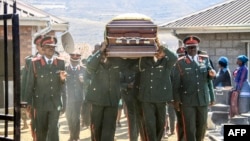The June 2017 elections were supposed to soothe the troubled politics of Lesotho, a tiny enclave surrounded on all sides by South Africa. It was the third poll in five years, after two successive coalitions collapsed amid vicious infighting and meddling from the army.
The third time was supposed to be the charm, as incoming prime minister Tom Thabane promised to swiftly enact reforms to loosen the military's stranglehold on politics.
But last week's killing of the army chief by two of his subordinates has raised concerns that more instability is ahead. The recent arrest of a journalist who criticized the government and the shutdown of his radio station has made the situation more dire, critics of the government say.
'Reign of terror'
Among those with high hopes for the new government were those who were voted out.
But in the past three months, says opposition politician Tlohang Sekhamane, the nation has fallen "under the reign of terror, and is fast degenerating into a dark political abyss of fear and consternation."
In an eight-page statement sent to VOA, the opposition documents a litany of worrying events, including police targeting residents thought to be opposition supporters; a brutal assault on a police spokeswoman by colleagues after she spoke about an investigation into the shooting death of the prime minister's estranged wife; and the arrest, alleged torture, and subsequent flight of an opposition lawmaker.
The nation's communication minister confirmed the lawmaker's August arrest, but said he was called in as a person of interest in a murder case, and was treated well while in custody.
Multiple attempts to reach the minister regarding the other allegations were not successful.
"We are literally under the reign of terror now," Sekhamane said to VOA. "The police can seize anybody, doesn't matter how very high-placed they were, a person at the level of minister can be taken, instructed to come to the police, and they do that, and then they can be tortured for three days, and then also over the weekend, and then they are forced to say certain things."
Rights watchdog Amnesty International says it is also worried about recent events in Lesotho.
"Really what we're seeing is patterns of arbitrary arrest, we're seeing allegations of torture and other ill treatment, we're seeing a lack of progress into criminal investigations for unlawful killings, and we're also seeing attacks on freedom of expression in Lesotho," said researcher Shireen Mukadam.
Why now?
Sekhamane says the opposition waited for months to speak up about their concerns. They were determined not do anything, he says, that could be "interpreted as an attempt on our path to destabilize the government or to make things difficult for the government."
"We were determined to leave this government to proceed, and govern this country for five years," he added.
Now, the opposition and rights groups are calling on the international community and on the Southern African Development Community, to assist in restoring the rule of law.
The Southern African Development Community has made numerous attempts at mediation in Lesotho, which has a history of military coups. Heads of state met over the weekend in South Africa to discuss the issue.
The SADC nations' frustration was clear, with host President Jacob Zuma saying, "We cannot, and shall not, be in Lesotho forever."




